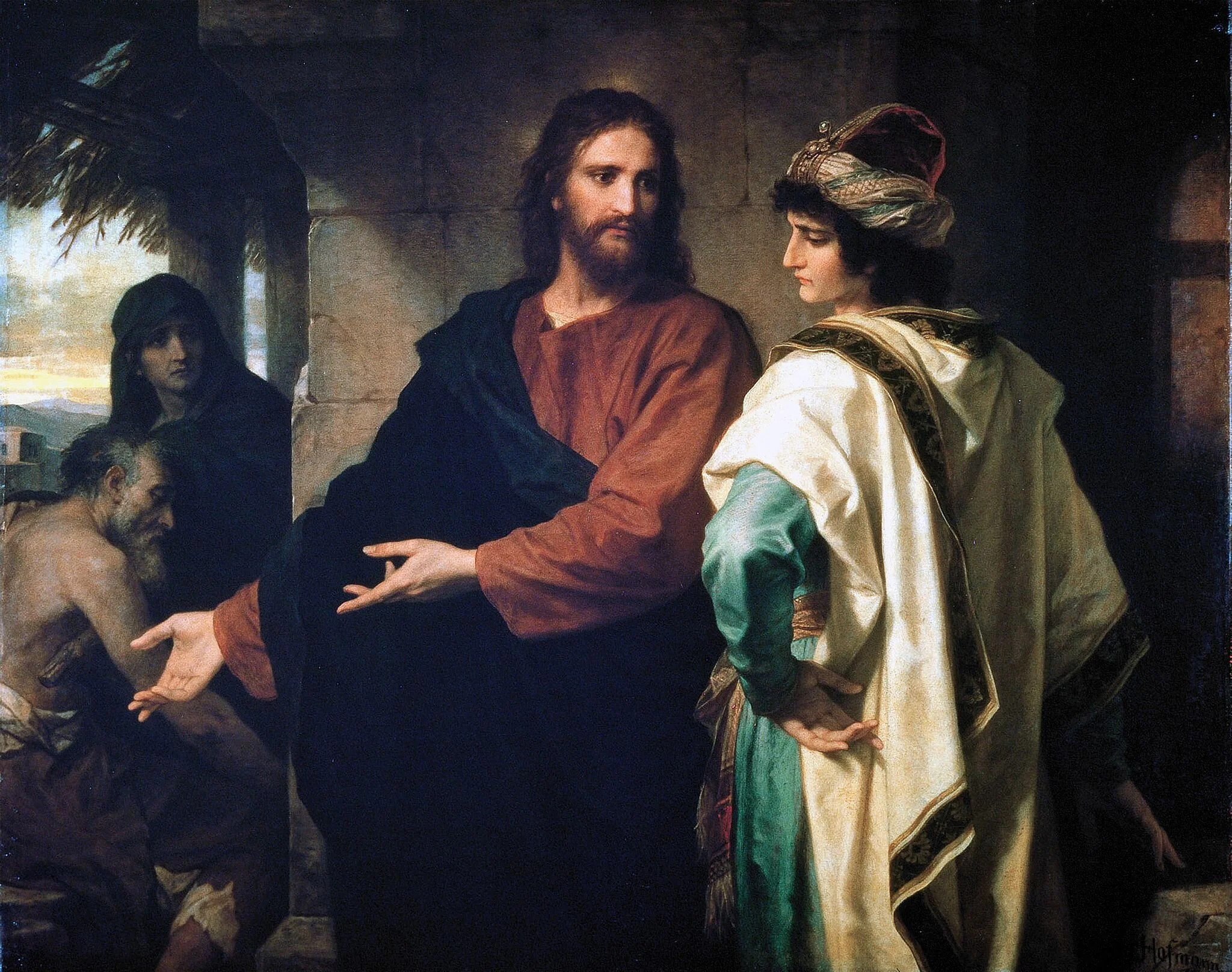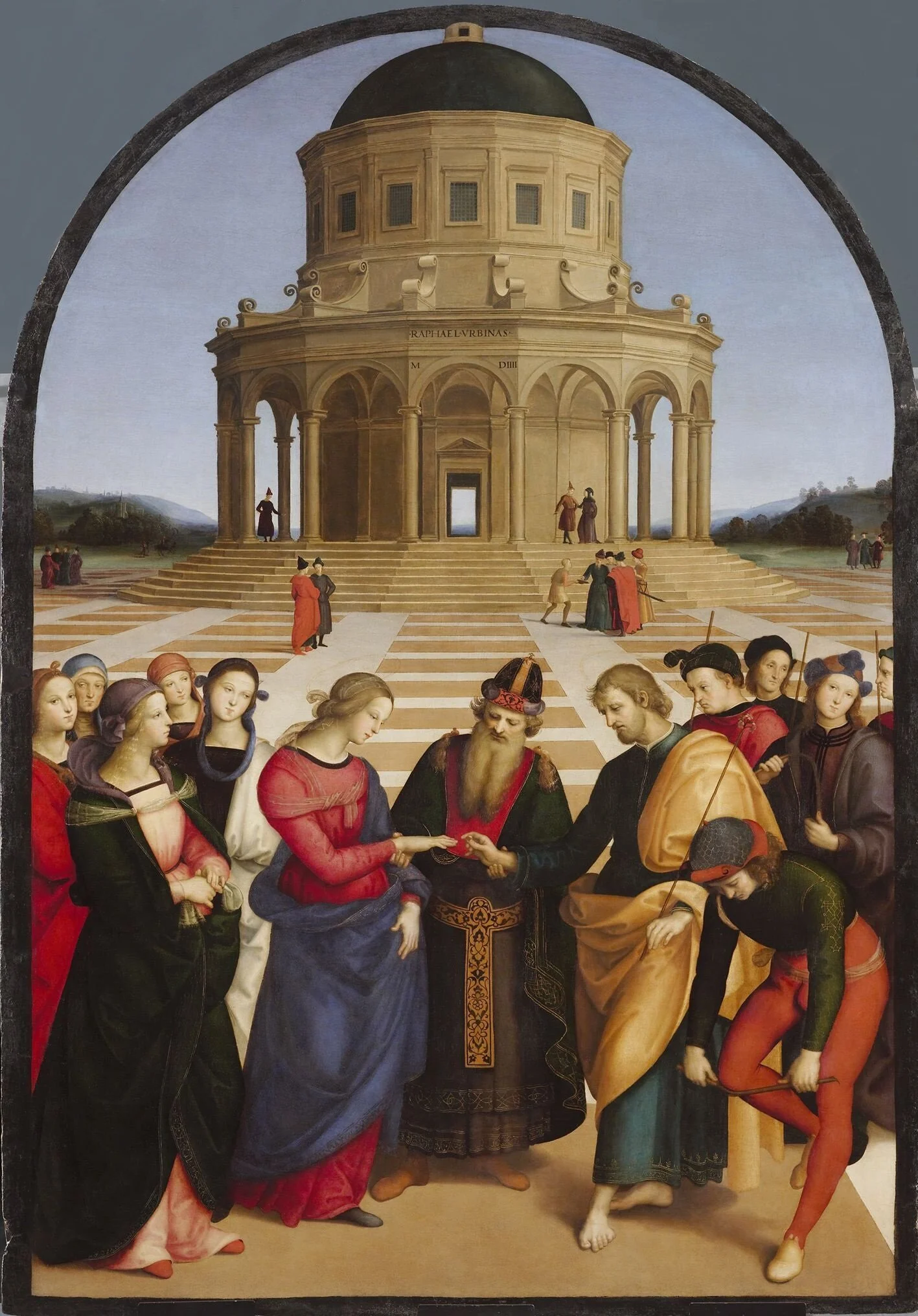Dominica XXVII per Annum B
3 October 2021
The Pharisees test Jesus in the Gospel passage by asking about marriage and divorce. The force of Jesus’ response remains powerful still today in an age marked by many challenges in relationships. The Pharisees were a very devout group of Jews who knew the Scriptures well. They indicate that Moses permitted a “bill” of divorce. They are referring to the teaching of Moses found in the Book of Deuteronomy 24:1-4. This is the first place in Scripture that mentions a permission for divorce. Jesus responds to the Pharisees by himself quoting the Book of Genesis and taking them back to “the beginning.” It’s like saying, see how far you have strayed… get back to God’s original idea and mind. Jesus interprets the witness in the Book of Genesis and indicates that divorce is not the mind of God and, furthermore, that to divorce and remarry is tantamount to adultery. The Catholic Church maintains this divine teaching because it is not human teaching but comes from God, and man has no authority to change divine teaching. How can we not maintain this teaching, if we take the Scriptures seriously?
In the exchange between Jesus and the Pharisees we learn that Moses permitted divorce due to the sinfulness of the people and their hardness of heart. But Jesus purifies the vision of his listeners. And he challenges them to live in accord with the mind of God. This Gospel lesson is challenging. I don’t want anyone to think that the message today is condemnatory. Or that the result should be embarrassment and shame. In speaking about the mind of God and the permanence of marriage we find a truth that we must hold up. As a Pastor I know that there are many challenges that come in relationships. I also know, as does the Church, that one rightly makes a distinction about the morality involved between one who breaks the marriage vows versus being a spouse who has been unjustly abandoned or divorced against his or her will. I am keenly sensitive too because divorce has marked my own family. But none of this changes that we must uphold what marriage is and we must expect spouses to strive for it, notwithstanding those cases where marriage vows have been irreparably harmed or one spouse refuses to work to improve the relationship. If you have questions about divorce or need to address a new and subsequent marriage that was accomplished outside the Catholic Church then I urge you to come see one of the parish clergy soon. Fr. Bali and I and Deacon Pereira will happily guide you.
In the Genesis account we see that the relationship of man and woman, their oneness in the flesh that is a hallmark of marriage, is something found within the very act of creation. It is God’s action that results in the creation of man and woman and it is God’s action that they belong together. This is why we believe that marriage is not at all a man-made institution, but a God-made one. Therefore, we accept in faith what God has made. At the same time, man has no ability or right to dissolve what God has united, to change what God has made, or to make other relationships equivalent to marriage. God made marriage within the very order of creation as a covenantal bond between one man and one woman. This is important to note, and all the more so in our troubled age. Notice that Adam does not leave his father and mother to marry Eve. No, Adam and Eve were made for one another and established as fitting partners in life. Since God established marriage and placed it within the very order of creation, “for this reason,” as the Scripture says, all future marriages involve a man leaving his father and mother and clinging to his wife. In other words, marriage involves a permanent unity reflective of that unity in creation that we see in Adam and Eve and – for this reason – a man leaves his father and mother and clings to his wife.
But these biblical passages have implications far beyond the question of marriage and divorce. This is so because we find here a Scriptural based anthropology, meaning an understanding of the origin and existence of mankind. This Scriptural anthropology presents a biblical vision of creation, the divine institution of marriage, the meaning of the body, the life-creating power of human and spousal love, and more. As Christians we accept as authoritative, divinely inspired, and inerrant, both the Old Testament and the New, and so the lessons of Genesis are brought together with the Gospel interpretation given by Jesus into a unified Christian anthropology. Do we accept and embrace this vision of creation, mankind, and moral life, especially as regards relationships like marriage? Do we let this vision transform us and our attitudes? While today’s readings touch upon marriage, we can note that this Christian anthropology in the Scriptures gives us guidance on many other issues in our secular modern age. In fact, given the tsunami of anti-traditional social constructions and novel ideas in the area of sexuality, gender, and marriage it is critical that we understand what godless forces in our society are proposing as a substitution for the Christian vision of creation. For if we pull up anchor from the foundations of Christian anthropology we quickly find ourselves swept away into all types of man-made constructions that are delusions aided by fairytale language presenting itself as a new version of reality. But it is no reality. What are some examples of being unmoored from reality due to rejecting Christian anthropology? I mean the separation and rejection of the procreative meaning of sexual love by use of contraception or by sterilization. The proliferation of abortion that leaves a baby dead and a woman scarred, at the very least emotionally and psychologically. So-called gay “marriage.” The idea that there is no discernible difference or even meaning to the body, to our physicality, such that a man can become a woman or a woman can become a man. The proliferation of made up genders on an almost daily basis. Things like non-binary, non-conforming. The claims of transgender ideology. The experience of modern life, uprooted from a biblical and Christian anthropology, has consequences. And very serious ones indeed. And we are seeing this all around us precisely because a Christian view is no longer the view of those who drive culture in our world. The experience of modern life apart from a Christian anthropology is like trying to tread water right near the edge of Niagara Falls and hoping not to get swept away. The last few years have been marked by radical delusion powered by mainstream media, and by leftist elites in our political and monied classes. There are real people with struggles in all the areas of morality I have mentioned. They need help, but instead are aided in living a fantasy by these made up ideas and nonsensical language. The elites with power put forward the stories of such suffering souls in order to tug at the heart strings by invoking a compassion that is false because it recreates a world that is not based upon reality. Would that our cultural response would be offering real help to the suffering, to help them see reality and to face their challenges, rather than going along with the lies and aiding and abetting the delusions we see all around us. This is what happens when you pull up anchor from reality. Reality reveals itself by the order of creation around us and it can be known by anyone of good will. And if you have faith, you can see this reality even more clearly.
Is accepting the Lord’s teaching demanding? Yes. But accepting his teaching is more than just a religious practice. It has much deeper meaning and consequence because the Christian vision of creation and mankind and relationship is accessible to all, no matter one’s faith. The rejection of the Christian vision revealed by God, is rejection of reality itself. And we are seeing those consequences all around us. As if on cue, this very week provided me with two relevant examples of what happens when we reject the Christian vision presented us in the Scriptures. An op-ed appeared in the New York Times entitled “Divorce Can Be an Act of Radical Self-Love” (New York Times Opinion, Lara Bazelon, September 30, 2021). In this article the author notes that her marriage was good. There was no abuse or neglect. No one was cheating. In fact, she says, there was love. She notes that she still loves her ex-husband and goes so far as to say that even now when he walks into the room her stomach drops just like a roller coaster drop, a reference to the breathlessness of love and attraction. She admits, “I divorced my husband not because I didn’t love him. I divorced him because I loved myself more.” One wonders whether the author realizes what she has just admitted and whether the editors at the New York Times really intend to promote narcissism as a cultural value? Also, this week a Texas abortion provider testified at a House Oversight Committee hearing saying, “abortion saves lives, …abortion is a blessing, abortion is an act of love, abortion is freedom” (Dr. Ghazaleh Moayedi).
At this point in human history we are well beyond the testing of the Pharisees. What a godless society proposes is not working because it is in opposition to the very order of creation, a creation we cannot pretend does not exist. The lesson from the Lord in the Gospel passage is a call to get back to “the beginning.” It is a lesson to accept God’s action in creation and the offer of His kingdom in childlike trust. We marvel at the age of the martyrs and how Christian witness confounded pagan empires. A new pagan empire is already here. As he said to the Pharisees, Jesus says to us today, it’s time to get back to “the beginning.” It’s time to be the saints, the witnesses, both the Lord and the world need!


